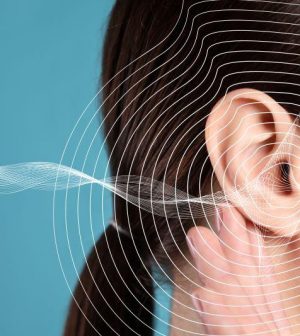- Could Your Grocery Store Meat Be Causing Recurring UTIs?
- Are You Making This Expensive Thermostat Error This Winter?
- Recognizing the Signs of Hypothyroidism
- 10 Strategies to Overcome Insomnia
- Could Artificial Sweeteners Be Aging the Brain Faster?
- Techniques for Soothing Your Nervous System
- Does the Water in Your House Smell Funny? Here’s Why
- Can a Daily Dose of Apple Cider Vinegar Actually Aid Weight Loss?
- 6 Health Beverages That Can Actually Spike Your Blood Sugar
- Treatment Options for Social Anxiety Disorder
New Clues to What Might Drive Tinnitus

Tinnitus, or “ringing in the ears,” affects up to 1 in every 10 people and can be disabling for some.
Now, scientists at the Massachusetts Ear and Eye Infirmary believe they may have discovered a key cause of the condition: A degeneration of nerves crucial to hearing.
“We won’t be able to cure tinnitus until we fully understand the mechanisms underlying its genesis. This work is a first step toward our ultimate goal of silencing tinnitus,” said study senior author Stéphane Maison, a principal investigator at Mass Eye and Ear and clinical director of the Mass Eye and Ear Tinnitus Clinic.
The buzzing, ringing and even roaring of tinnitus can impair everyday life.
“Beyond the nuisance of having persistent ringing or other sounds in the ears, tinnitus symptoms are debilitating in many patients, causing sleep deprivation, social isolation, anxiety and depression, adversely affecting work performance and reducing significantly their quality of life,” Maison said in a Mass Eye and Ear news release.
Numerous theories have been floated as to the origins of tinnitus. As far back as 2009, researchers at Mass Eye and Ear discovered that folks can develop the condition even after they test normal on a standard hearing test.
That led them to a condition dubbed cochlear synaptopathy — a kind of “hidden” hearing loss involving loss of the auditory nerve.
In their study, Maison’s group examined patients who had normal hearing on tests, but also had tinnitus.
They confirmed a loss of auditory nerve function among these patients, as well as a kind of hyperactivity in the patients’ brainstems.
The study was published Nov. 30 in the journal Scientific Reports.
“Our work reconciles the idea that tinnitus may be triggered by a loss of auditory nerve, including in people with normal hearing,” Maison said.
His team now plans to conduct research aimed at seeing whether a restoration of auditory nerve function might banish tinnitus.
“The idea that, one day, researchers might be able to bring back the missing sound to the brain and, perhaps, reduce its hyperactivity in conjunction with retraining, definitely brings the hope of a cure closer to reality,” Maison explained.
More information
Find out more about tinnitus at the National Institute of Deafness and Other Communication Disorders.
SOURCE: Massachusetts Ear and Eye Infirmary, news release, Nov. 30, 2023
Source: HealthDay
Copyright © 2026 HealthDay. All rights reserved.










